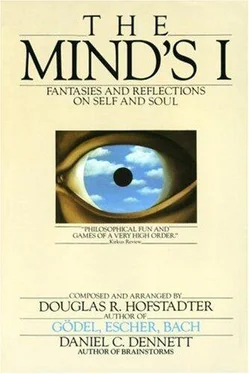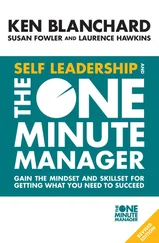PAT: That’s true. But when they work together, a lot of unexpected things happen. There are so many complexities and rich modes of behaviour that all that mechanicalness adds up to something very fluid.
SANDY: For me it’s an almost unimaginable transition from the mechanical level of molecules to the living level of cells. But it’s what convinces me that people are machines. That thought makes me uncomfortable in some ways, but in other ways it is an exhilarating thought.
CHRIS: If people are machines, how come it’s so hard to convince them of the fact? Surely if we are machines, we ought to be able to recognize our own machinehood?
SANDY: You have to allow for emotional factors here. To be told you’re a machine is, in a way, to be told that you’re nothing more than your physical parts, and it brings you face to face with your own mortality. That’s something nobody finds easy to face. But beyond the emotional objection, to see yourself as a machine you have to jump all the way from the bottommost mechanical level to the level where the complex lifelike activities take place. If there are many intermediate layers, they act as a shield, and the mechanical quality becomes almost invisible. I think that’s how intelligent machines will seem to us—and to themselves!—when they come around.
PAT: I once heard a funny idea about what will happen when we eventually have intelligent machines. When we try to implant that intelligence into devices we’d like to control, their behaviour won’t be so predictable.
SANDY: They’ll have a quirky little “flame” inside, maybe?
PAT: maybe.
CHRIS: So what’s so funny about that?
PAT: Well, think of military missiles. The more sophisticated their target-tracking computers get, according to this idea, the less predictably they will function. Eventually you’ll have missiles that will decide they are pacifists and will turn around and go home and land quietly without blowing up. We could even have “smart bullets” that turn around in mid-flight because they don’t want to commit suicide!
SANDY: That’s a lovely thought.
CHRIS: I’m very skeptical about these ideas. Still, Sandy, I’d like to hear your predictions about when intelligent machines will come to be.
SANDY: It won’t be for a long time, probably, that we’ll see anything remotely resembling the level of human intelligence. It just rests on too awesomely complicated a substrate—the brain—for us to be able to duplicate it in the foreseeable future. Anyway, that’s my opinion.
PAT: Do you think a program will ever pass the Turing test?
SANDY: That’s a pretty hard question. I guess there are various degrees of passing such a test, when you come down to it. It’s not black and white. First of all, it depends on who the interrogator is. A simpleton might be totally taken in by some programs today. But secondly, it depends on how deeply you are allowed to probe.
PAT: Then you could have a scale of Turing tests—one-minute versions, five-minute versions, hour-long versions, and so forth. Wouldn’t it be interesting if some official organization sponsored a periodic competition, like the annual computer-chess championships, for programs to try to pass the Turing test?
CHRIS: The program that lasted the longest against some panel of distinguished judges would be the winner. Perhaps there could be a big prize for the first program that fools a famous judge for, say, ten minutes.
PAT: What would a program do with a prize?
CHRIS: Come now, Past. If a program’s good enough to fool the judges, don’t you think it’s good enough to enjoy the prize?
PAT: Sure, especially if the prize is an evening out on the town, dancing with all the interrogators.
SANDY: I’d certainly like to see something like that established. I think it could be hilarious to watch the first programs flop pathetically!
PAT: You’re pretty skeptical, aren’t you? Well, do you think any computer program today could pass a five-minute Turing test, given a sophisticate interrogator?
SANDY: I seriously doubt it. It’s partly because no one is really working on it explicitly. However, there is one program called “Parry” which its inventors claim has already passed a rudimentary version of the Turing test. In a series of remotely conducted interviews, Parry fooled several psychiatrists who were told they were talking to either a computer or a paranoid patient. This was an improvement over an earlier version, in which psychiatrists were imply handed transcripts of short interviews and asked to determine which ones were with a genuine paranoid and which ones with a computer simulation.
PAT: You mean they didn’t have the chance to ask any questions? That’s a severe handicap—and it doesn’t seem to be in the spirit of the Turing test. Imagine someone trying to tell me which sex I belong to just by reading a transcript of a few remarks made by me. It might be very hard! So I’m glad the procedure has been improved.
CHRIS: How do you get a computer to act like a paranoid?
SANDY: I’m not saying it does act like a paranoid, only that some psychiatrists, under unusual circumstances, thought so. One of the things that bothered me about this pseudo-Turing test is the way Parry works. “He”—as they call him—acts like a paranoid in that he gets abruptly defensive, veers away from undesirable topics in the conversation, and, in essence, maintains control so that no one can truly probe “him.” In this way, a simulation of a paranoid is a lot easier than a simulation of a normal person.
PAT: No kidding! It reminds me of the joke about the easiest kind of human for a computer program to simulate.
CHRIS: What is that?
PAT: A catatonic patient—they just sit and do nothing at all for days on end. Even I could write a computer program to do that!
SANDY: An interesting thing about Parry is that it creates no sentences on it’s own—it merely selects from a huge repertoire of canned sentences the one that best responds to the input sentence.
PAT: Amazing! But that would probably be impossible on a larger scale, wouldn’t it?
SANDY: Yes. The number of sentences you’d need to store to be able to respond in a normal way to all possible sentences in a conversation is astronomical and really unimaginable. And they would have to be so intricately indexed for retrieval.... Anybody who thinks that somehow a program could be rigged up just to pull sentences out of storage like record in a jukebox, and that this program could pass the Turing test, has not thought very hard about it. The funny part about it is that it is just this kind of unrealizable program that some enemies of artificial intelligence cite when arguing against the concept of the Turing test. Instead of a truly intelligent machine, they want you to imagine a gigantic, lumbering robot that intones canned sentences in a dull monotone. It’s assumed that you could see through to its mechanical level with ease, even if it were simultaneously performing tasks that we think of as fluid, intelligent processes. Then the critics say, “You see! It would still be just a machine—a mechanical device, not intelligent at all!” I see things almost the opposite way. If I were shown a machine that can do things that I can do—I mean pass the Turing test—then, instead of feeling insulted or threatened, I’d chime in with the philosopher Raymond Smullyan and say, “How wonderful machines are!”
CHRIS: If you could ask a computer just one question in the Turing test, what would it be?
PAT: How about “If you could ask a computer just one question in the Turing test, what would it be?”?
Many people are put off by the provision in the Turing test requiring the contestants in the Imitation game to be in another room from the judge, so only their verbal responses can be observed. As an element in a parlour game the rule makes sense, but how could a legitimate scientific proposal include a deliberate attempt to hide facts from the judges? By placing the candidates for intelligence in “black boxes” and leaving noting as evidence but a restricted range of “external behaviour” (in this case, verbal output by typing), the Turing test seems to settle dogmatically on some form of behaviourism, or (worse) operationalism, or (worse still) verificationism. (These three cousins are horrible monster isms of the recent past, reputed to have been roundly refuted by philosophers of science and interred—but what is that sickening sound? Can they be stirring in their graves? We should have driven stakes through their hearts!) Is the Turing test just a case of what John Searle calls “operationalist sleight of hand”?
Читать дальше











